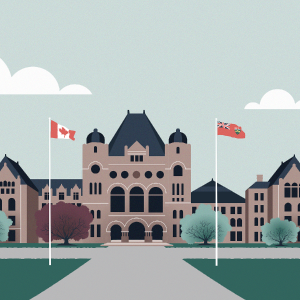The Toronto Local Appeal Body (the “TLAB”) stands as Ontario’s sole local appeals body for planning matters, ruling over appeals of variance and consent decisions from Toronto’s Committee of Adjustment (the “CoA”). Nearly ten years after the TLAB’s inception, the Body has had some successes but remains particularly limited by its role as an administrative tribunal.
Legislative Intent
After 2006 changes to the City of Toronto Act[1] made a local appeal body possible, Toronto City Council (“Council”) directed staff to prepare an exploratory report. The report gave two reasons for establishing a local appeal body:
1. As CoA matters are “entirely local” they “should not be subject to review by a Provincial body.”
2. A local appeal body “demonstrated the City’s commitment towards further reducing the scope of the Ontario Municipal Board [the “OMB”]’s decision-making sphere of influence.”[2]
Following nearly ten years of development, in March 2016, Council voted 37-5 (2 absent) to approve the TLAB.[3] The heated debate occurred against a backdrop of staff recommending against it in 2014.[4] Two main arguments during the debate emerged in support of establishing the TLAB:
1. the Tribunal would empower residents to shape their city;[5] and
2. the normative claim that Toronto was a unique municipal government.
The first argument was passionate in rhetoric; for example, Councillor Jaye Robinson reminded Council that “every month we lose [to debate], my neighbourhoods get decimated.“[6] The policy idea of the first argument was that all the members of the appeal body would be from Toronto, unlike Ontario Municipal Board (OMB) matters, which are, Councillor Gord Perks suggested, “heard by people who couldn’t find the subway with a map.”[7] The debate also proposed different ways to empower and “give residents more input over the shape of our city.”[8]
The second argument, connected to longstanding Toronto positions, goes that Toronto has a “higher” level of government relative to other localities. On the idea of the distinctiveness of Toronto municipal governance, Councillor Paula Fletcher explained “[w]e are considered a mature order of government.… it shouldn’t surprise us that we want to take a step to get out from under the Ontario Municipal Board.”[9]
Opposition to these arguments questioned the purpose and cost of the body, primarily due to the concern that a quasi-judicial and independent body would be no different from the OMB. Councillor Norm Kelly, for example, argued, “[i]f these are quasi-judicial tribunals then they will observe the same rules or principles that the present appeal body, the OMB, does. I don’t see any advantage of a local body compared to the OMB.”[10]
Overall, the debate was antagonistic. At one point, Josh Matlow declared “I hate the OMB! I despise it.”[11] Moving beyond the heated anti-OMB rhetoric, we can establish that Council’s legislative intention was to create a local appeal body that empowered residents and was distinct from the OMB.
Lessons Learned – Distinct from the OMB/OLT
The TLAB has struggled to distinguish itself, first from the OMB and now from its successor, the Ontario Land Tribunal (“OLT”). Part of this reason is the nature of administrative tribunals.
Administrative tribunals are bound by their enabling statutes. As such, tribunals with adjudicative functions are not meant to represent cities or their interests but instead be impartial examiners of the issues before them. In Newfoundland Telephone Co, the Supreme Court of Canada explained that the conduct of adjudicative tribunals must meet the “standard applicable to courts”, which is to say that the conduct “should be such that there could be no reasonable apprehension of bias with regard to their decision.”[12] Therefore, TLAB members must adhere to strict and impartial standards, as do members of the OLT.
The legislative agenda – to rid Toronto of a hostile adjudication board – while politically captivating, does not make much sense in the context of administrative law. Due to the highly technical nature of variance and consent decisions, the TLAB was inevitably going to be bound by the same tests and criteria as the OMB/OLT in fulfilling its adjudicative function.
The interpretation of evidence under the Planning Act and Provincial Planning Statement should, as a matter of fact, look highly similar whether it is a panel member of the TLAB or the OLT. The strict and procedural rules of administrative law in a planning context essentially restrict the ability of the TLAB to be distinct from the OLT.
Lessons Learned – Empower Residents
Council’s intention that residents would be better empowered relied on the premise that municipal control of the tribunal would advance the interests of residents.
On member selection, the TLAB has succeeded by mandating that panel members be residents of Toronto – a relatively unique provision among tribunals in Ontario. While it is fair to assume members can now use a subway map, this is still not likely to impact the assessments made by the members. In fact, if a member were to show an overt pro-Toronto stance, over evaluating the issues according to the provincial Planning Act, one could easily raise claim apprehension of bias for breaching the strict court-like standards.
In an attempt to quell concerns between neighbours, the TLAB has successfully introduced mediation, as advocated during the legislative debate.[13] While the TLAB has crafted unique mediation rules, such as not allowing it within 30 days of a hearing date, mediation is not altogether unique. The OLT, as the OMB before it, routinely engages in mediations.
The TLAB has also carved out unique roles for third parties in a bid to engage concerned citizens. The TLAB, for example, introduced an ability for participants – unlike at the OLT – to ask clarifying questions where allowed by panel members.[14] However, the role of participants, like empowering residents as a whole, remains restricted by provincial legislation. Further, the roles of both parties and participants before the TLAB were scaled back via the limiting of third party appeals under Bill 23[15] - meaning the role of third party residents in the TLAB process closely mirrors their narrow role before the OLT.
Finally, the TLAB introduced the novel “local knowledge expert” to proceedings – a title different from the TLAB role of expert and without an OLT equivalent. Local knowledge experts must prove the nature of their expertise but can rely on “significant knowledge of an area’s history, its people” or other relevant “facets of the community.”[16]
Have Local Knowledge Expert’s made a difference? In 1941120 Ontario Ltd (Re), an individual failed to qualify as a local knowledge expert for not having the requisite education, experience, or knowledge of the area. While Vice-Chair Bassios did open the door to qualifying on neighbourhood knowledge alone, the denial of status was because the views expressed were “heavy on opinion and light on substantiation, sometimes mistaken, and mostly irrelevant to the grounds for a decision – the four tests set out in the Planning Act.”[17] Thus, even the unique and creative local knowledge expert role cannot escape the technical nature of an adjudicative planning tribunal.
Conclusion
For places contemplating their own local appeal body, the lessons of TLAB are highly limited. As an adjudicative tribunal held to the strict standards of courts, it is hard to see how TLAB decisions could, or even should, unfold differently than the OLT. The limited difference between the tribunals leads to a more stark criticism of the municipally-funded local appeal body compared to the provincially funded OLT – in the end, municipalities will pay more for the same.
[1] Stronger City of Toronto for a Stronger Ontario Act, 2006, SO 2006, c. 11.
[2] City of Toronto, Chief Planner and Executive Director of City Planning, Establishing a Local Appeal Body for Committee of Adjustment Decisions, Status Report (25 September 2008) at 2, online (pdf): <https://www.toronto.ca/legdocs/mmis/2008/pg/bgrd/backgroundfile-15995.pdf>
[3] Toronto, City Council Meetings,“EX13.1 Follow-Up Report on a Local Appeal Body (LAB) for Toronto” (31 March 2016) at 08:00:50, online (YouTube): <https://secure.toronto.ca/council/#/committees/961/10872> [Council].
[4] Ibid at 06:01:34. When pressed if staff would recommend the TLAB now, staff reiterated their 2014 stance and emphasized improving the CoA instead: see ibid at 06:21:20.
[5] Ibid (“This is an opportunity to give residents more input over the shape of our city” at 06:46:30 [transcribed by author]).
[6] Ibid at 06:45:39 [transcribed by author]).
[7] Ibid (“It is frequently the case that matters are… heard by people who couldn’t find the subway with a map” at 07:03:05 [transcribed by author]).
[8] Ibid (“This is an opportunity to give residents more input over the shape of our city” at 06:46:30 [transcribed by author]).
[9] Ibid at 07:51:02 [transcribed by author]).
[10] Ibid at 07:32:02 [transcribed by author]).
[11] Ibid at 06:56:00 [transcribed by author]).
[12] Newfoundland Telephone Co v Newfoundland (Board of Commissioners of Public Utilities), [1992] 1 SCR 623 at 638.
[13] Council, supra note 12 (“I believe that mediation is the solution to many of the problems that we have. On minor variances, when one person, whether the applicant or the neighbour, doesn’t agree, having an opportunity to understand and discuss those differences and try to settle them, is much better than the current process. It doesn’t happen now” at 07:18:45 [transcribed by author]).
[14] City of Toronto, Toronto Local Appeal Body, Rules of Practice and Procedure, (14 June 2024) at 21, online (pdf): < https://www.toronto.ca/wp-content/uploads/2025/04/96b0-Toronto-Local-Appeal-BodyRules-of-Practice-and-ProcedureMarch-28-2025.pdf>.
[15] More Homes Built Faster Act, 2022, SO 2022, c 21.
[16] City of Toronto, Toronto Local Appeal Body, Toronto Local Appeal Body – Practice Directions and Announcements, Practice Direction 6: Expert Witnesses, (26 May 2020) online: https://www.toronto.ca/city-government/planning-development/committee-of-adjustment/appeals/toronto-local-appeal-body-practice-directions/>.
Any article or other information or content expressed or made available in this Section is that of the respective author(s) and not of the OBA.










